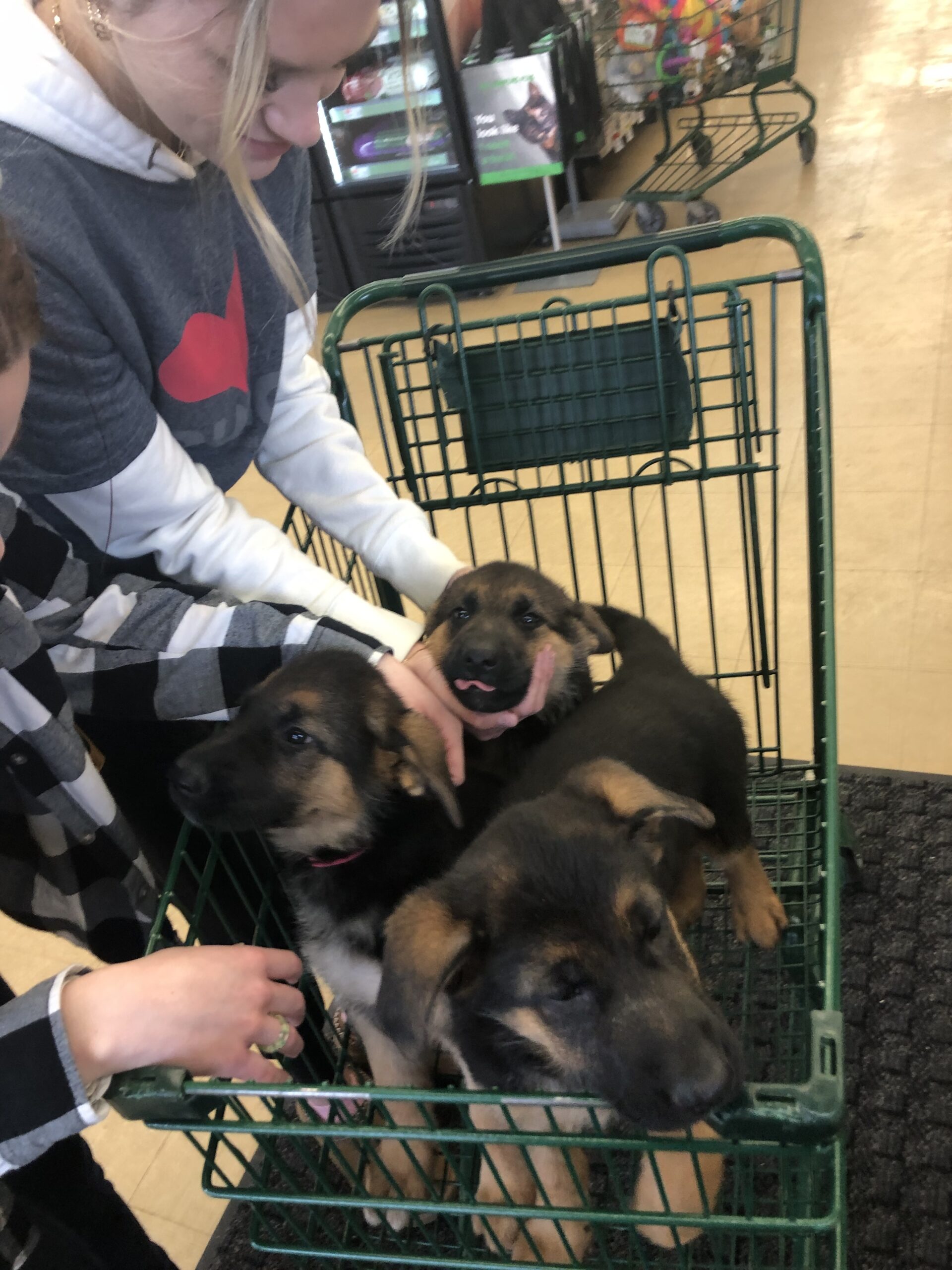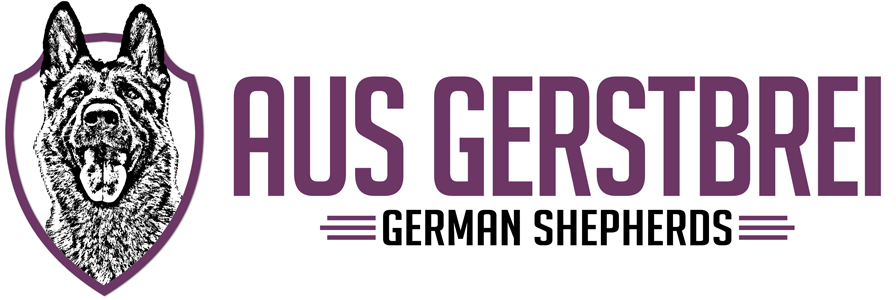What is Socialization?
- It’s actually just what it sounds like – introducing a German Shepherd puppy or dog to social situations. This includes people, other dogs, other pets, new areas and different situations. Each experience must be a positive experience. We like to teach our dogs to focus on us. Other than our own pack dogs we do not let our puppies meet other dogs but rather know they are there and feed them for focusing back on us. This minimalizes the potential for leash reactivity later. This also avoids bad situations with unknown dogs.
Why Is Socialization So Important?
- All puppies, including German Shepherd puppies, need to learn appropriate behavior. It’s critical for puppies to learn this early on. Otherwise, your German Shepherd dog will be either too shy or aggressive in varying situations. You want your dog to be able to handle new people and new situations.
 How aus Gerstbrei German Shepherds Socializes Puppies
How aus Gerstbrei German Shepherds Socializes Puppies
- In my home, we have plenty of different people in and out of our Indiana home. They all love puppies and dogs and play with them. We also expose our German Shepherd puppies to other dogs and pets within our own pack. Another socialization technique is taking the dogs to new environments. We make sure our German Shepherd puppies have as many socialization opportunities as possible.
Here are some socialization tips you can use once you bring your German Shepherd puppy home:
Socialization Do’s
- Your biggest job is to PROTECT your puppy’s confidence. Make sure that each of the following events are pleasant and non-threatening. If your puppy’s first experience with something is painful and frightening, you will be defeating your purpose. In fact, you will be creating a phobia that will often last a lifetime. It’s better to go too slow and assure your puppy is not frightened or injured than to rush and force your pup to meet new things and people.
- Invite friends over to meet your pup. Include men, women, youngsters, oldsters, different ethnic backgrounds, etc. instruct the guests to let the puppy initiate the meeting rather than rushing up to the puppy. Treats are great here to teach the dog to sit when going up to a new person for a treat.
- We highly caution inviting other dogs over or trying to do meetings with other dogs. One bad experience can make a lifetime of aggression. We like to take our puppies around controlled dogs in the distance and use it as a distraction for obedience with us.
- Carry your puppy to shopping centers, parks, school playgrounds, etc; places where there are crowds of people and plenty of activity.
- Take your puppy for short, frequent rides in your vehicle. Stop the car and let your puppy watch the world go by through the window.
- Introduce your puppy to umbrellas, bags, boxes, ceiling fans, the vacuum cleaner, etc. Encourage your puppy to explore and investigate your home.
- Get your puppy used to seeing different and unfamiliar objects by creating your own. Set a chair upside down. Lay an empty trash can on its side, set up the ironing board right-side up one day and upside down the next day.
- Introduce your puppy to new and various sounds but do not overwhelm them and make a problem.
- Accustom your puppy to being brushed, bathed, inspected, having its nails clipped, teeth and ears cleaned and all the routines of grooming and physical examination.
- Introduce your puppy to stairs, his own leash and collar. Introduce anything and everything you want your puppy to be comfortable with and around.
Socialization Don’ts
- Do not put your puppy on the ground where unknown animals have access. This is where your puppy can pick up diseases. Wait until your puppy’s second shots are completed, which can be as early as eight weeks of age. Do not let your pup socialize with dogs that appear sick or dogs that you don’t know, that may not be vaccinated.
- Do not reward fearful behavior. In a well meaning attempt to sooth, encourage or calm the puppy when it appears frightened, we often unintentionally reward the behavior. It’s normal for the puppy to show some signs of apprehension when confronting anything new and different. Walk up to the new thing and show them you aren’t afraid of this so they may explore it as well.
- Do not allow the experience to be harmful, painful or excessively frightening. This can cause lifetime phobias in your dog.
- Do not force or rush your puppy. Let your puppy take things at his own pace. Your job is to provide the opportunity.
- if your puppy does not want to socialize with people do not force it. Instead use it as a session to have the puppy get rewards for focusing on you, ignoring people the same as they do trees and bushes around them. Forcing your puppy to accept touching from another person can create a fear aggression problem as they do go through stages. This is especially important to follow when they hit their fear stages.
- Do not let people or children rush your puppy. Have treats available and instruct them to wait for the puppy to come to them and to feed them from their palm not fingers. If petting do not touch their head but under their chin or the side.
- Do not do too much at one time. Young puppies need a lot of sleep and tire quickly. It is much more productive to have frequent and very brief exposures than occasional prolonged exposures.this can be as little as a 5 to 10 minute pit stop in a parking lot.
DO NOT WAIT!! Every day that goes by is an opportunity of a lifetime that is lost forever. You can never get these days back. If socialization does not happen now, it never will.
